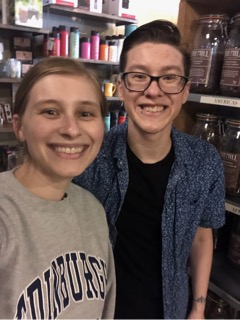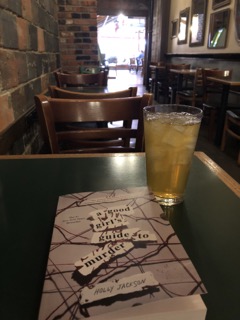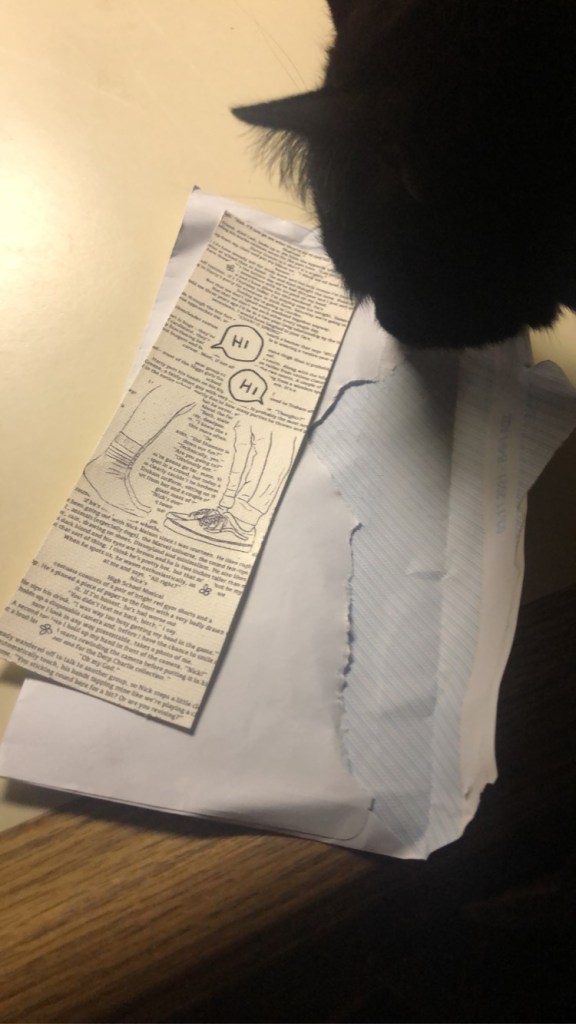What I Got:
- A Good Girl’s Guide to Murder by Holly Jackson
- Café con Lychee by Emery Lee
- De Profundis by Oscar Wilde
- Zone One by Colson Whitehead
- The Last True Poets of the Sea by Julia Drake
What I Read:
- My Brother’s Husband: Vol. 1-2 by Gengoroh Tagame and translated by Anne Ishii
- Written in the Stars (ARC) by Alexandria Bellefleur
- Bloom (reread) by Kevin Panetta and Savanna Ganucheau
- Sexuality: A Graphic Guide by Meg-John Barker and Jules Scheele
- A Good Girl’s Guide to Murder by Holly Jackson
- The Importance of Being Earnest & Other Plays by Oscar Wilde
- Today Is the Last Day of the Rest of Your Life by Ulli Lust and translated by Kim Thompson
- Café con Lychee by Emery Lee
- “The Little Mermaid” (audio) by Hans Christian Andersen
- The Complete Poetry of Edgar Allan Poe by Edgar Allan Poe
May showers are over! Even if there are more showers, they are now June showers, which are better. Because June is Pride Month, so every rainbow after the rain is even better in June.

This past month was overwhelming, though not without its good moments. I got a summer haircut that gives me gender euphoria and extra time in the mornings to spend on not my hair. My family took a trip to Half Price Books on my mom’s birthday. I hung out with my sister and dad for “bachelor’s weekend.” And, most importantly, I read a lot of good books, so let’s get started!
I ended up accidentally yo-yoing between queer romances and classics throughout most of the month, with only a couple of exceptions. I decided to discuss them chronologically rather than in groups, so please forgive any awkward transitions between reviews!
Because I’ve been obsessed with Netflix’s Heartstopper but wanted to consume some new media, I picked up another queer romance. Written in the Stars by Alexandria Bellefleur was not a YA romance like I thought, but instead an adult romance between two women—one a writer for a popular astrology social media account, the other a serious and resistant-to-love career woman. The romance involves character growth on both sides of the relationship—both partners have something to offer the other without undermining their personalities and pasts and traumas. The story starts with a disastrous blind date and makes many cute references to boxed wine. (I’m pretty sure I only noticed that because I’ve been listening to the podcast And That’s Why We Drink.) Plus, there’s a cute escape room scene.
This is a cute, grumpy-sunshine romance that includes some amazing friends and sibling relationships. If I knew more about astrology, I would have gotten more out of the lists Elle makes, but other than that, I didn’t feel like the author excluded those without astrology knowledge.
In full honesty, it took me waaaayyyy too long to make the Pride and Prejudice connection even with the names Darcy and Elle. And with the personality resemblances. Oops… Still, it’s a solid sapphic romance, fun and mostly light-hearted.
Still in the mood for some queer wholesomeness, I read the My Brother’s Husband graphic novels. Yaichi’s estranged twin brother has died, and now his brother’s Canadian husband Mike is visiting Japan to see his partner’s home. Mike stays with Yaichi and his daughter Kana. And Kana is absolutely enamored with her Canadian uncle Mike. Throughout these two volumes, Yaichi confronts his own homophobia and how that may have led to his weakened relationship with his brother.

My favorite moment is when the dad is thinking about gay rights and starting to see the injustices all around him, realizing how he himself has acted in ways that support these injustices. He makes a comment like, “I’m turning into my daughter.” Kana shows how kids are just cool with anything because they haven’t been taught prejudice yet.
If possible, the second volume is even more wholesome than the first. It doesn’t skirt around the fact that being gay is unaccepted in a lot of places, but this story is mainly about someone learning about acceptance through collective grieving. They are an unconventional family in many ways, and they show affection with such genuine gestures, even between two men. (Hooray for deconstructing toxic masculinity in Japanese culture!)
Instead of just accepting queerness internally, Yaichi ends up arguing against a homophobe in defense of his brother’s husband. Yaichi even thinks and talks about what might happen if his daughter came out later in life; he doesn’t want his kid to feel like she needs to keep that a secret. It’s such a lovely thing to see a parent coming to the realization that their kids will grow and evolve and may not be entirely what they expect.
This second volume explores in even more depth how prejudice is learned and not innate. One of Kana’s friends even says that she knows some people don’t agree with certain marriages, but she thinks “when people love each other and can get married… it’s a beautiful thing.”
Sexuality: A Graphic Guide is a concise yet wide-reaching summary of a lot of research on sexology and sexuality. It’s for those of us who want to learn more about queer theory and sexology but don’t want to or have the resources to dig into the nitty-gritty details. This text made me think more critically about myself and society in ways that will be beneficial for myself, my community, and the world. The illustrations add an element of humor and simple examples of complex ideas. They also serve the purpose of making the text less daunting. The information feels more accessible because the illustrations add a human element to what could be a highly theoretical discussion.

“YA murder mystery” has become one of my favorite genres for when I need an easy distraction. (And I definitely needed distractions during May.) They make me feel so smart, and they’re fun, too!
Usually, I reach for a Karen M. McManus when I have a hankering for a YA mystery, but I’ve maxed out her current backlist. So I went for a book that many people have compared to hers: A Good Girl’s Guide to Murder by Holly Jackson. This book lives up to the hype, in my opinion, if you go into it with realistic expectations. It’s not anything groundbreaking, but I blew through it in only a couple days, and I’m usually pretty slow at getting started on books. Her writing just speeds you along through the plot, and before you know it, you’re invested.
The multimedia aspect of this book is really well done, too. It doesn’t feel forced, and Holly Jackson doesn’t repeat information between the text and the other media unless necessary. She allows the reader to imagine some scenes on their own and fill in blanks as the threads come together.
I agree with the book-internet that Holly Jackson has Karen M. McManus vibes, and I live for it. There are the unlikely friendships that come together while investigating a murder and/or mystery; the small moments of shock that show up even if you predict the outcome of the investigation; and the sketchy locations in small, quiet communities that somehow everyone knows about but never speaks of.
A lot of the media I’ve been consuming lately has been very similar in tone, so I decided that I needed to switch it up. What better way to do that than go for an Oscar Wilde classic? I’ve been wanting to read more of Oscar Wilde’s work, and The Importance of Being Earnest and Other Plays seemed like the best place to start. I love a good comedy of manners, so I knew I was in for a treat. And I was right!
All three plays were hilarious, if very focused on gender binaries. Lady Windermere’s Fan pokes fun at what high society determines to be the qualities of a “good” woman versus a “bad” one. There are, of course, funny misunderstandings and miscommunications, though it all ends as happily as it can. (Plus I discovered the origins of a lyric from MIKA’s song “Good Guys,” which is just a solid bop.) An Ideal Husband follows a similar idea but from the opposite side—women discussing the qualities of a good husband.

And then the pièce de resistance: The Importance of Being Earnest. A lot of this play seemed familiar to me, so I’m thinking I may have actually read this before and just forgot about it, but the play was still hilarious! Wilde takes the idea of a lie of convenience and turns it around, showing how inconvenient it can become. And then the plot twist of a lie becoming a truth when unknown facts are revealed—genius! Everyone in this play is connected, often in unexpected ways, and the revelations are comedic and genuine at the same time. I can’t wait to continue reading his work!
I picked up Today Is the Last Day of the Rest of Your Life by Ulli Lust on a whim at the library. And let me tell ya, it was a wild ride. Punks, hitchhiking, Italy, the mafia, free food, rampant sexism, hiking—the works! It’s an account of Ulli’s travels across Austria and to Italy with a punk friend, very little money or resources, and no plan beyond getting past the border. The illustration style is very casual and a little chaotic, which fits with the whole punk DIY culture, but also makes some of the illustrations difficult to read. I do like that Ulli doesn’t try to create a narrative for her story. She just tells/shows it as it is.
Even though a lot of the content in this book is distressing, I found myself emotionally distanced from what was going on. Maybe it was because of the black and white illustrations, or the translation, or any number of other things. Even so, this is one of a kind (not in a bad way); I’m not sure I’ll ever come across a book quite like this again.
It’s time to get back on the queer romance train! Choo choo, gays. Café con Lychee by Emery Lee was a totally random discovery—an impulse buy when Barnes & Noble had a sale on pre-orders. And it was pure serendipity. This book got me feeling #emo in the best way possible. Lee wrote an amazing piece of queer YA media that has so many elements I love. The characters are wonderful, and even the side characters grow as people throughout the story (minus Gabi’s friend whose only personality trait is being obsessed with planning Homecoming). I love a good enemies-to-lovers and grumpy-sunshine romance, plus there’s food involved, plus it’s gay, plus there’s sports, plus the title is a PUN. How could I not enjoy this book?

Having been rivals for years, Gabi’s and Theo’s parents both own restaurants that offer foods from their respective cultures in a mostly white town. Now, though, there’s a new “world fusion” restaurant (run by white people) that threatens both family businesses. And when Gabi and Theo end up working together on an in-school delivery system, the rest is history.
The two things that bumped this wonderful story down from a 5 to a 4 star rating are the overly simple writing and the unresolved plot with Gabi’s love of dancing. I wish the writing had a bit more detail, especially surrounding the scenes in which Gabi, Theo, and Justin are making food. Those scenes just feel a little vague, like all of a sudden they’d have the food ready in the next scene. And Gabi’s dancing seems to only be there for the Homecoming parade scene and as an example of him doing something “feminine” that his dad wouldn’t like.
This story does such a good job of exploring the nuances of coming out and dealing with family as a queer person. How apologies and not-worst-case scenarios don’t erase everything, can still leave you feeling horrible. How you can have these feelings of betrayal and hurt while also being relieved and hopeful that more healing can come. (It has Heartstopper vibes in that it’s joyful without ignoring the difficulties of being a queer teen.)
Toward the end of the story, Emery Lee does a great job of showing that Gabi and Theo are realizing they can have a future as queer teens and adults. For a lot of queer teens (and twenty-somethings, tbh), it’s hard to picture a future in which they are openly queer, happy, and fulfilled at the same time. Lee showing eir characters saying they have time, there’s always the future, etc. is really heartwarming and powerful.
I can’t wait to read Emery Lee’s other book (Meet Cute Diary) and any other books e comes out with. E has potential to be a new favorite author!
Last month, I mentioned Geoff Castellucci’s amazing narrations, and this month I decided to listen to his reading of “The Little Mermaid” by Hans Christian Andersen. Even though The Little Mermaid is my favorite classic Disney film, this is the first time I’ve ever read the original story in its entirety, and I have to say, I really enjoyed this version despite its significantly darker tone. I was even surprised by the ending.
The original “Little Mermaid” involves more than just her desire to become human for the prince (or even just to experience land-living). The little mermaid’s grandmother tells her that, though humans’ lives are centuries shorter than mermaids’, humans have eternal souls, and mermaids do not. The little mermaid’s desire for an eternal soul is something that gave this fairytale a lot more depth than I’d expected. At the end, she turns into sea foam (which is the part I already knew), but there’s a hopeful finale involving a sort of purgatory in which souls like the little mermaid’s can stay, doing good for humanity and earning their eternal souls.
Though there are no singing crustaceans, octopus drag queens, or cute fish sidekicks, this version is still one of my favorite fairytales. It has surprising depth and passionate characters, just like the movie adaptation.
Last but definitely not least, I went for another classic: Edgar Allan Poe’s poetry. I love me some Edgar Allan Poe. I think about “The Tell-Tale Heart” more often than I care to admit. It’s one of those stories that has stuck with me since I read it for the first time in high school. But I can’t say I’d read much of Poe’s poetry beyond “Annabel Lee” and “The Raven” before reading this book.
In his poetry, Poe focuses mainly on lost and/or unrequited loves, dreams versus reality (a.k.a. in-between lands), and the macabre details of death. His trademark melancholy is present in many of these poems, too, as well as many references to the Quran for some reason. I also noticed that he uses bodies of water, like lakes or oceans, as metaphors in many of his poems. Metaphors involving large bodies of water have always intrigued me, so I particularly enjoyed rereading “Annabel Lee” and reading “The Lake” for the first time.

Though I’m still a basic bitch and like “The Raven” the most of all Poe’s poems, “The Bells” is now one of my favorites, too. It’s a surprisingly fun poem that uses onomatopoeia and repeated sounds to create a sort of rhythm while describing different types of bells that we encounter in life. I feel like it would also be super fun to read out loud, too.
As I mentioned before, this month is Pride Month, which means I’m going to try to stick to a TBR based on Round 9 of the Queer Lit Readathon. I usually do the prompts throughout the whole month (one-week readathons are no fun for me), and I always enjoy myself with these challenges. Hopefully I can get to them all and discuss them with you next month.
Until then, have a gay old time, read lots of LGBTQ+ lit, and do what you can to support the queer people in your life and in the world. Ciao for now!
